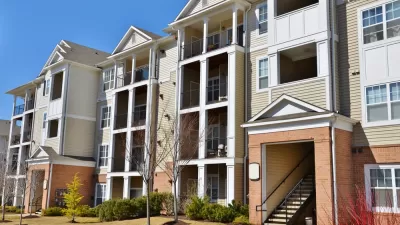The Denver City Council recently adopted the “Expanding Housing Affordability” policy.

The Denver City Council earlier this month approved a mandatory inclusionary zoning ordinance that requires developers to include income-restricted housing for all developments of more than ten total units.
The city needs more than 50,000 units of affordable housing to address its housing shortage, according to the Denver Housing Authority.
“The Expanding Housing Affordability policy will mandate that developers building multifamily projects with ten or more units create income-restricted housing for households making between 60% and 90% of the area median income — currently, between $56,592 and $84,888 for a family of three,” reports Kyle Harris for Denverite. “Those projects will be required to maintain between 8% and 15% of the units as income-restricted for 99 years. Those percentages will be slightly higher in downtown, Cherry Creek, and other high-cost parts of the city.”
Developers can also pay a fee to avoid the affordable housing requirement, according to Harris. The city has been working on the Expanding Housing Affordability policy since 2020, but a state law approved in 2021 enabled the City Council’s approval of the new law.
More news coverage and insight into the debate about Denver’s new mandatory inclusionary zoning policy ca be found in a separate article in the Denver Post.
FULL STORY: City Council mandates developers help solve Denver’s housing crisis — even if some don’t want to

Alabama: Trump Terminates Settlements for Black Communities Harmed By Raw Sewage
Trump deemed the landmark civil rights agreement “illegal DEI and environmental justice policy.”

Planetizen Federal Action Tracker
A weekly monitor of how Trump’s orders and actions are impacting planners and planning in America.

The 120 Year Old Tiny Home Villages That Sheltered San Francisco’s Earthquake Refugees
More than a century ago, San Francisco mobilized to house thousands of residents displaced by the 1906 earthquake. Could their strategy offer a model for the present?

In Both Crashes and Crime, Public Transportation is Far Safer than Driving
Contrary to popular assumptions, public transportation has far lower crash and crime rates than automobile travel. For safer communities, improve and encourage transit travel.

Report: Zoning Reforms Should Complement Nashville’s Ambitious Transit Plan
Without reform, restrictive zoning codes will limit the impact of the city’s planned transit expansion and could exclude some of the residents who depend on transit the most.

Judge Orders Release of Frozen IRA, IIJA Funding
The decision is a victory for environmental groups who charged that freezing funds for critical infrastructure and disaster response programs caused “real and irreparable harm” to communities.
Urban Design for Planners 1: Software Tools
This six-course series explores essential urban design concepts using open source software and equips planners with the tools they need to participate fully in the urban design process.
Planning for Universal Design
Learn the tools for implementing Universal Design in planning regulations.
Clanton & Associates, Inc.
Jessamine County Fiscal Court
Institute for Housing and Urban Development Studies (IHS)
City of Grandview
Harvard GSD Executive Education
Toledo-Lucas County Plan Commissions
Salt Lake City
NYU Wagner Graduate School of Public Service





























